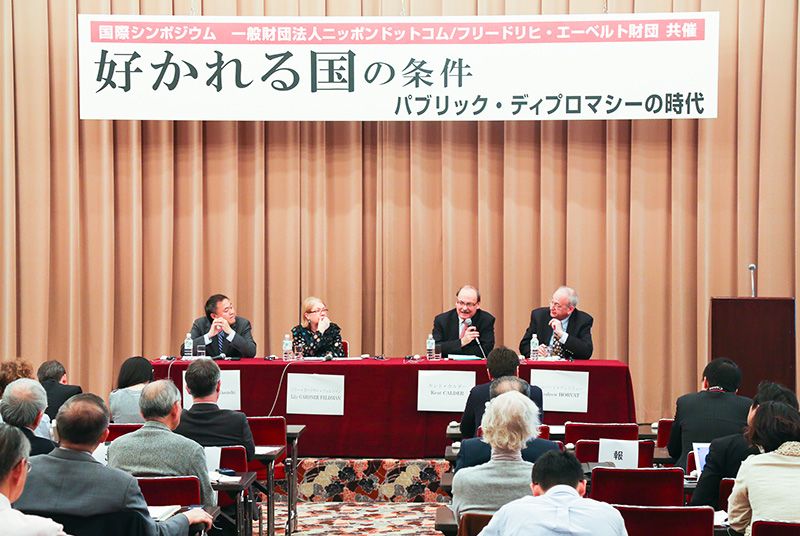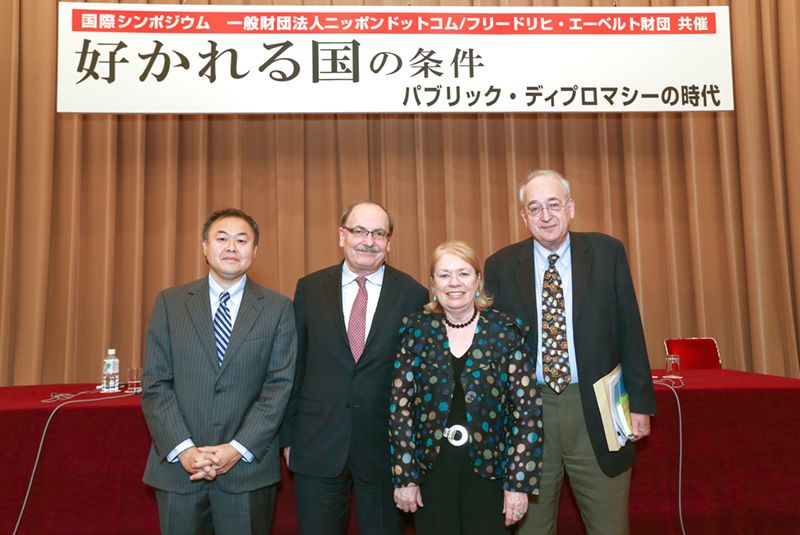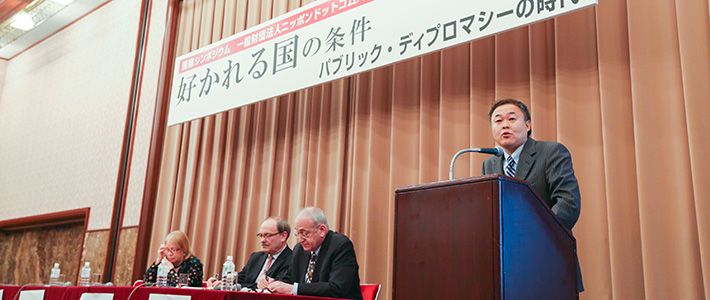
The Age of Public Diplomacy: From Enmity to Amity
Politics Culture- English
- 日本語
- 简体字
- 繁體字
- Français
- Español
- العربية
- Русский
For the first session the keynote speaker, Kent Calder, was joined by Lily Gardner Feldman, senior fellow at the American Institute for Contemporary German Studies, and Watanabe Yasushi, professor in the faculty of environment and information studies at Keiō University.
From Enmity to Amity
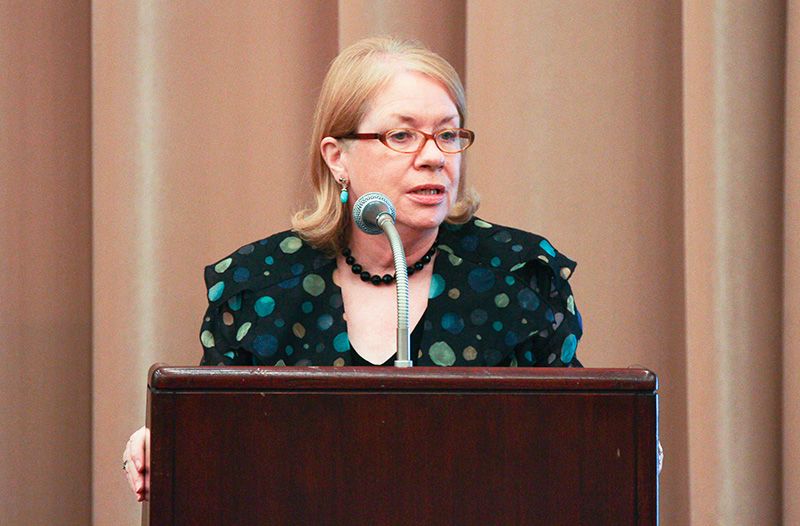 Feldman, a specialist on German foreign policy and international reconciliation, remarked that there are two kinds of public diplomacy. The first is carried out by the government and aims at improving the national image. The second concerns activities in which NGOs and other nongovernmental actors play the leading role. These activities might be described as “paradiplomacy,” or “transnationalism” in the case of projects that transcend national borders. She said that for public diplomacy to be successful, a partnership between government and nongovernment actors was essential.
Feldman, a specialist on German foreign policy and international reconciliation, remarked that there are two kinds of public diplomacy. The first is carried out by the government and aims at improving the national image. The second concerns activities in which NGOs and other nongovernmental actors play the leading role. These activities might be described as “paradiplomacy,” or “transnationalism” in the case of projects that transcend national borders. She said that for public diplomacy to be successful, a partnership between government and nongovernment actors was essential.
Feldman suggested that Germany’s successes since the end of the Second World War might serve as a useful point of reference as Japan considers the direction its own public diplomacy should take, allowing for obvious differences between the two countries’ systems, culture, and history.
Since 1949, Germany has made a determined effort to develop a positive image in the international community. The first priority was the country’s relationship with the newly founded Jewish state of Israel. Thanks to several decades of continuing efforts, over the past ten years Germany has built a relationship of trust with Israel such that it is now acknowledged that “for Israel, Germany is an ally second only to the United States.” For Germany to have built a close relationship of this kind just 70 years after the Holocaust, Feldman said, was “nothing short of miraculous.” She also spoke of Germany’s successful reconciliation with France, its “traditional enemy,” and the building of friendly relations with Poland and the former Czechoslovakia after the Cold War.
Dealing with the Past: The Need for Courageous Leaders
For Germany, accepting responsibility for past crimes and confronting historical issues face-on has formed the heart of the country’s public diplomacy efforts.
Feldman outlined several reasons why Germany’s postwar public diplomacy has been so successful. These were: consistency, so that public diplomacy efforts are not swayed by changes of government; a reciprocal approach to joint action with other countries; and the central role of civil society as a catalyst in building amicable relations with former enemy countries. After reunification, Germany was more active in its public diplomacy than ever in an attempt to dispel fears of a renewed threat from an enlarged Germany.
Of course, the road from enmity to amity was not always smooth. There were frequent instances of protest and resistance from within Germany. Feldman said this showed the need for a political and social leadership that could push through public diplomacy with “vision and courage.” As an example of courageous leadership, she mentioned Konrad Adenauer, who entered reparation negotiations with Israel in 1951, in spite of considerable resistance to the idea within Germany.
Important Points for Japanese Public Diplomacy
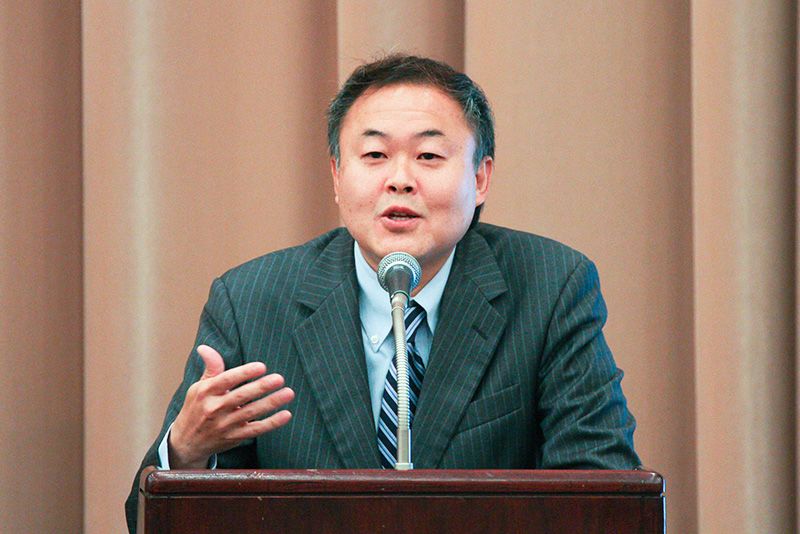 Next to speak was Watanabe Yasushi, a Keiō University professor whose publications include a book about culture and diplomacy. His remarks about points to bear in mind when thinking about public diplomacy were based on his experiences as a member of a committee of experts formed to discuss Japan’s PR and cultural diplomacy after the earthquake and tsunami disaster of March 2011. (Read some of his thoughts on public diplomacy in this article.)
Next to speak was Watanabe Yasushi, a Keiō University professor whose publications include a book about culture and diplomacy. His remarks about points to bear in mind when thinking about public diplomacy were based on his experiences as a member of a committee of experts formed to discuss Japan’s PR and cultural diplomacy after the earthquake and tsunami disaster of March 2011. (Read some of his thoughts on public diplomacy in this article.)
First, he said, it was important not to rise to provocations. Although a rebuttal may sometimes be necessary, overreacting often ends up damaging the national interest. Public diplomacy should aim above all to build a basis for developing mutual understanding and closeness. Only once this foundation is in place can policy and publicity function. At the moment too much attention is given to these aspects before an adequate foundation has been put in place. This means that important aspects of public diplomacy like learned dialogue and cultural exchange are often neglected.
He also pointed out that a government cannot control the national image. For this reason, the government should not be the single player in any public diplomacy efforts. In the case of the hate speech that is an increasing problem in Japan at the moment, for example, images of what is happening will spread via YouTube and similar media regardless of how Prime Minister Abe Shinzō criticizes them.
He stressed that it was important not to think of the national and international as two mutually opposed categories. In public diplomacy, the objective should not be to “compete” with other countries, he said, calling for a mechanism to transform competition into collaboration. Particularly in the case of Northeast Asia, he said, where Japan’s relations with neighboring countries continue to be tense, it is vital to move away from zero-sum thinking and seek a positive-sum, win-win type of public diplomacy.
Civil Society in Japan: Still on a Learning Curve
The discussion was followed by comments from Kent Calder and Andrew Horvat, who acted as moderator. Calder spoke about the European Community mentioned by Feldman in her remarks. Although the EC had grown out of specific circumstances unique to Europe, he said, Japan could do more to consider the potential of a similar multinational organization in East Asia. Such a framework might go some way toward resolving the paralysis in bilateral relations through more multilateral exchanges, noted Calder.
Horvat suggested that Japanese civil society still lacked sufficient cohesiveness to provide effective help in pursuing public diplomacy. Watanabe responded by saying that since the Meiji Restoration there has been a deep-rooted feeling in Japan that diplomacy and foreign policy were the proper business of the government. There is also the fact that the government does not completely trust civil society. In the reviews of government spending carried out under the Democratic Party of Japan government a few years ago, many projects relating to sister cities projects and international exchange programs had their budgets drastically cut. This was largely because politicians tend to demand short-term results, he said.
At present, he said, civil society in Japan was still at the “learning stage” in terms of dealing with policy, but the reality was that the basic capacity was already in place. The need now was to think about how to channel that energy effectively into public diplomacy, he said.
Sister Cities and Educational Exchanges: Room for Improvement
During the discussion that followed, all the panelists emphasized the importance of close cooperation through twin cities schemes, something touched upon by Kent Calder in his keynote presentation. It was suggested that by twinning cities not just between Japan and the United States but also across the Sea of Japan with Korea, China, and Southeast Asia would be an effective way to bring new vitality to exchanges on a regional level, without becoming tangled up in the historical problems that tend to complicate bilateral relations. Calder said he believed this would be a useful contribution to improving international relations in Northeast Asia.
Finally, Horvat spoke about an educational exchange program that has been running in Kyoto since 1989, which he suggested was a good example of a Japanese public diplomacy success. Many Japanese universities could do more, he said, to encourage applications from students from underprivileged backgrounds in countries like China and South Korea.
Photos by Itabashi Yūichi
foreign policy public diplomacy international relations policy exchange
